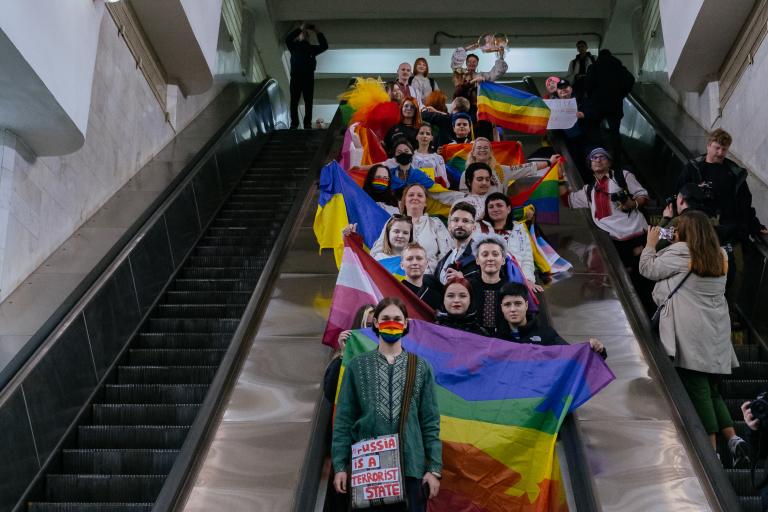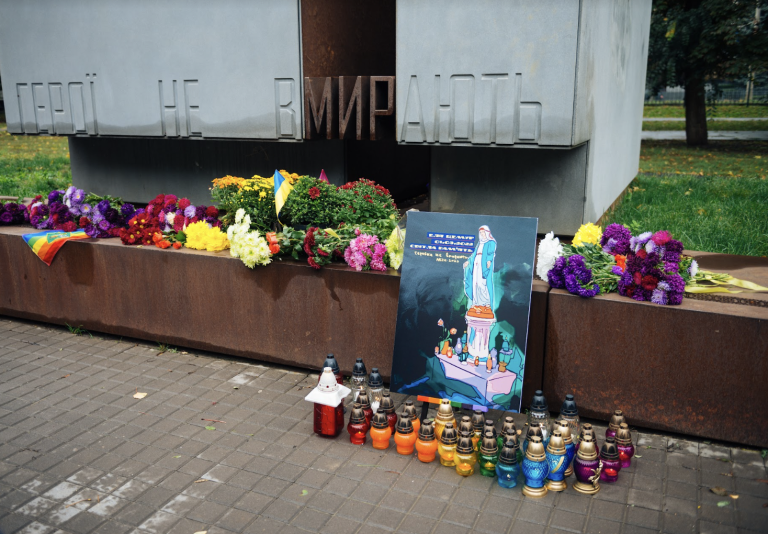
Insights
KharkivPride: “We Are Different, But Ukraine Unites Us”
Region(s)
TOPIC(s)
Type
Commentary
Author(s)
Publish Date
October 23, 2022
Share
Ukraine’s second largest city, Kharkiv, has held Pride marches three times before. By any account, 2022 was unique. The march took place underground in the subway system, the safest place to gather in a region that has experienced relentless Russian bombardment. And its message of unity, within and beyond Kharkiv’s lesbian, gay, bisexual, transgender, intersex and queer (LGBTIQ) community, resonated as never before.
“It was time for us to find those points of intersection, the points that connect people of different backgrounds, of different identities, and emphasize that regardless of our differences, we are all Ukrainian,” said Ruslana Hnatchenko of Sphere, a queer women’s association that coordinates KharkivPride. Sphere launched a weeklong campaign in late September entitled United as Never Before, which sought to inspire Ukraine’s LGBTIQ rights movement and to assert queer people’s place in the national effort to defend Ukraine. As an LGBTIQ organization in eastern Ukraine, said Hnatchenko, Sphere is not just on the war’s frontlines. “We are on the frontlines of different struggles in Ukraine. We are also in the fight against prejudice, against homophobia and transphobia. We are fighting for equality.”

Activists pulled together the campaign under pressure, “with constant air raids and night evacuations to bomb shelters and basements” according to a communication from Sphere to Outright International. ”The situation in Ukraine remains very unpredictable: every day we can learn both good news about the [Russian] de-occupation of Ukrainian cities and towns, and bitter news about terrorist attacks and bombings of Ukrainian cities, and hundreds and thousands of new victims among the civilians.”
At the 25 September Pride march, thirty people dressed in traditional Ukrainian embroidered shirts (vyshyvanka) and rainbow symbols marched through three subway lines and 10 stations. Safety was paramount: In addition to staying underground, all participants were vetted and the group was kept small to avoid interfering with daily subway use—the safest way to travel in the city. They received full support from the police.
Hnatchenko emphasizes, however, that Pride was not a celebration. “For us this year, it was more like a memorial week…This was not a time for clapping hands and opening champagne.” One day of the week was devoted to honoring of LGBTIQ people killed in the war, including Elvira Shchemur, a KharkivPride volunteer, killed during a Russian airstrike on 1 March.
The campaign also included a video manifesto on social media and placing posters with variations on the slogan, "We are different, but Ukraine unites us," on transport lines, social media channels, and 31 billboards in Ukraine’s three largest cities, Kyiv, Kharkiv, and Odesa. Sphere heard through private messages that the campaign “inspired and comforted” people. In one case, a young woman whose father had seen one of the posters recounted to Sphere team members that the posters helped her start a conversation with her father, which led her to come out to him.
Sphere also undertook public action to promote marriage equality to highlight that, while LGBTIQ people are fighting for Ukraine’s freedom along with all other citizens, they still do not have the right to receive support if a spouse is killed or injured, as those who can marry do. Activists drove through the city in a car adorned with rainbow wedding decorations and signs.

KharkivPride is over, but the work is far from done. Sphere, like other Ukrainian LGBTIQ organizations, will continue to provide emergency assistance to LGBTIQ people who need it. Of great importance is reducing isolation in their community. Says Hnatchenko, “We have heard from people after relocating that they have felt lost, that they lack support and don’t know anyone in their new cities. People said that they missed our community center, where we could socialize. So, we would like to bring activities to them, where they are.” They intend to reopen their center when it is safe.
Hnatchenko and her colleagues at Sphere deeply appreciate the support they have received, saying, “We really hope that people will keep believing in us. We are forced to give up many things that are important to us; however, we continue to fight for the sake of all those who cannot.”

Take Action
When you support our research, you support a growing global movement and celebrate LGBTIQ lives everywhere.
Donate Now